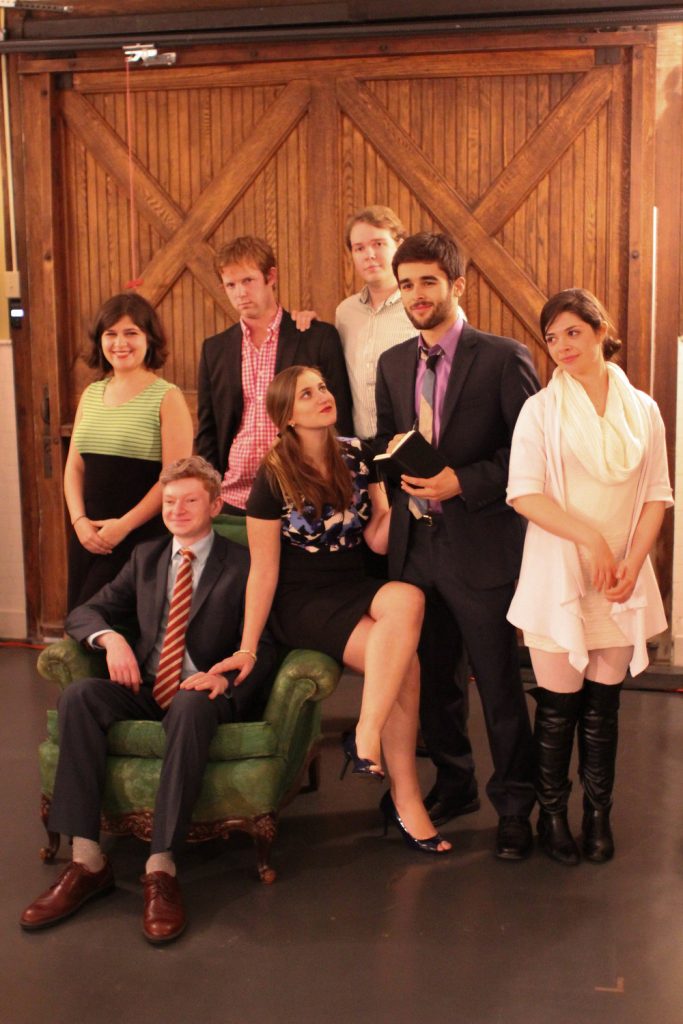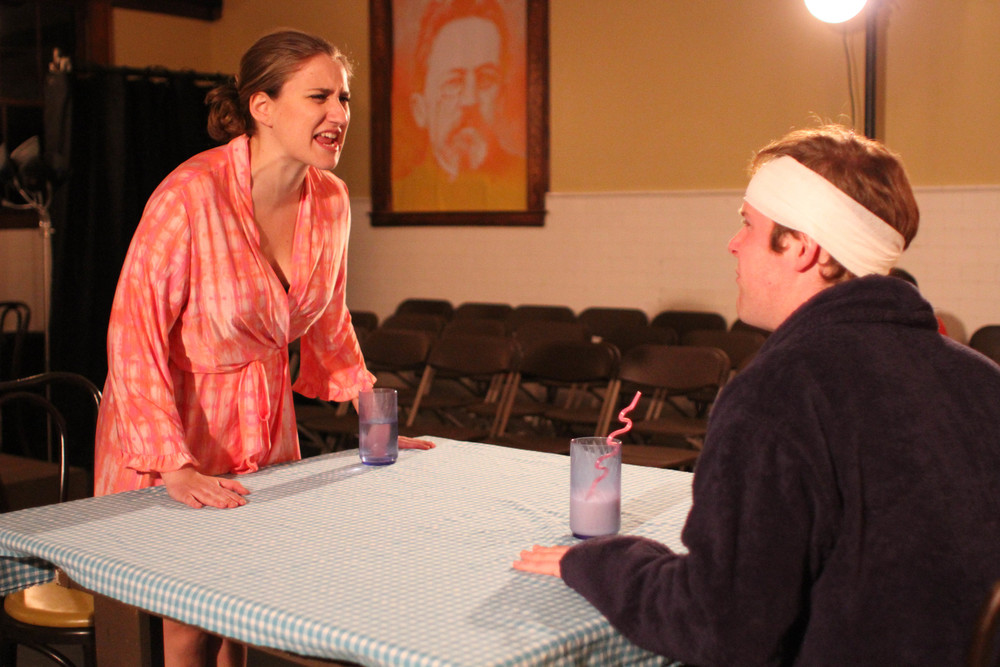
BACK: Alison Schilling ’15, John Noble Barrack ’15, Tom Chandler ’16 FRONT: Zachary Cohn ’16, Becca Zipursky ’15, Chris Naughton ’17, and Molly Burdick ’17
A Spin on Chekhov, With Feeling
By: Caity Cook ’18
The Carriage House is buzzing. Paint cans sit open on the floor, crew sets props and lights, cast members arrive for warm-ups, and the open space of this unique venue transforms into an exciting play world. But despite this frenzy of activity, Danielle Turner ’15 and Joan Lawson ’15—co-directors of Stupid F*cking Bird: A Sort-Of Adaptation of The Seagull—are collected and enthusiastic. For them, as well as the performers, this project reflects months of tremendous dedication, and they are ready to share it with the community. Lawson describes the journey through rehearsals as “smooth,” mainly due to the cast and crew, who she describes as “a bunch of talented people who have been wonderful to work with.” Turner echoes this sentiment, while also speaking to the quality of the script: “It’s just one of the best plays I’ve ever read in my entire life.”
Aaron Posner’s modern-day take on Anton Chekhov’s The Seagull transplants the classic nineteenth-century Russian drama into the hands of a cast of artists, each struggling in their own way. The ensemble features aspiring playwright Conrad (John Noble Barrack ’15); Nina (Molly Burdick ’17), a young actress; Emma (Rebecca Zipursky ’15), Conrad’s mother and a star of the theater world; Trigorin (Chris Naughton ’17), a successful author; Dev (Tom Chandler ’16), Conrad’s friend and a love-struck musician; misanthropic but heartfelt Mash (Alison Schilling ’15); and the reluctantly aging Sorn (Zachary Cohn ’16).
Posner’s script vacillates between realistic recreations of Chekhov’s work and interactive meta-theatricality. The first act opens with the presentation of Conrad’s latest play, but quickly transforms into a type of confessional, as each of the characters introduces themselves to the audience and tells their side of the story. Conrad introduces further meta-theatrical elements into the performance throughout the show, as he directly addresses the audience, refers to Chekhov’s original play, and even flips off a portrait of Chekhov hanging on the wall.

Rebecca Zipursky ’15 and John Noble Barrack ’15
As the play moves forward into its second and third acts, the show transforms into a tragedy that reveals the devastating pain brought on by love, life, and the theater—with the characters reaching intense emotional extremes. Luckily, the rehearsal process opened up plenty of room for the actors to explore these heavy moments. As Barrack described, the company provided “a completely safe environment where I could risk looking incredibly stupid and could fail gloriously.” Zipursky echoed this sentiment, calling the company an “environment of support and excitement.”
If the success of the production rests so profoundly on the company’s excitement for the project, then Turner and Lawson deserve credit for stirring up such passion through their own dedication. In order to produce Stupid F*cking Bird, the two relied on grants and donations acquired using skills they had gained through their time in both the Skidmore Theater Department as well as the Arts Administration program. The project began with Turner and Lawson as directors and producers, then as more people signed on, additional positions were picked up by company members. In addition to acting, Schilling composed original music for the show, sound designed, and ran the box office—while Zipursky designed the programs. Turner also took on marketing responsibilities, while Lawson designed the show’s costumes. Almost indirectly, the directors discovered that they had put together a production company, which they dubbed Loophole Productions. In an appropriate gesture for show that so thoroughly champions the arts in both its execution and its subject matter, proceeds from the performance were donated to the National Arts Education Fund.
